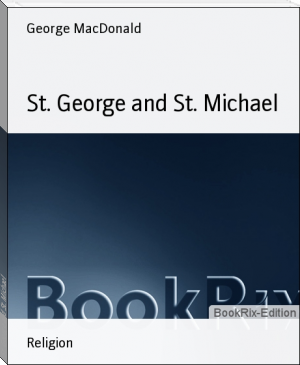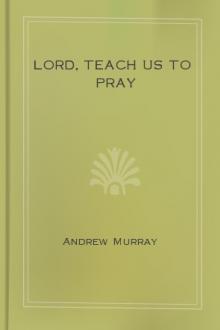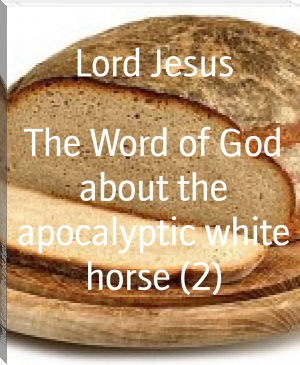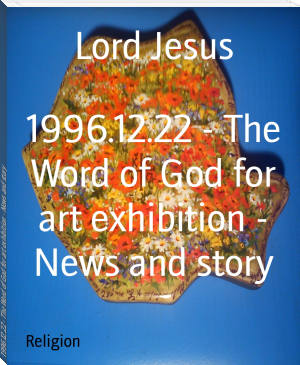St. George and St. Michael - George MacDonald (beach books .txt) 📗

- Author: George MacDonald
Book online «St. George and St. Michael - George MacDonald (beach books .txt) 📗». Author George MacDonald
eyes, and waited.
'I have it!' he cried again. 'It shall be so, and my father shall thus have immediate notice. The nights are weekly growing warmer, and he will not therein be tempted to his hurt. Our trusty and well-beloved cousin Dorothy, we herewith, in presence of our liege and lovely lady, appoint thee our deputy during our absence. No one but thyself hath a right to cross the bridge after dark, save Caspar and the governor, whom with my father I shall inform and warn concerning what is to be done. But I will myself adjust the escape, so that the torrent shall not fall too powerful; Caspar must connect it with the drawbridge, whose fall will then open it. And pray remind him to see first that all the hinges and joints concerned be well greased, that it may fall instantly.'
So saying, he left the room, and sought out Caspar, with whom he contrived the ringing of a bell in the marquis's chamber by the drawbridge in its fall, the arrangement for which Caspar was to carry out that same evening after dark. He next sought his father, and told him and his brother Charles the whole story; nor did he find himself wrong in his expectation that the prospect of so good a jest would go far to console the marquis for the annoyance of finding that his household was not quite such a pattern one as he had supposed. That there was anything of conspiracy or treachery involved, he did not for a moment believe.
After dinner, while the horses were brought out, lord Herbert went again to his wife's room. There was little Molly waiting to bid him good-bye, and she sat upon his knee until it was time for him to go. The child's looks made his heart sad, and his wife could not restrain her tears when she saw him gaze upon her so mournfully. It was with a heavy heart that, when the moment of departure came, he rose, gave her into her mother's arms, clasped them both in one embrace, and hurried from the room. He ought to be a noble king for whom such men and women make such sacrifices.
To witness such devotion on the part of personages to whom she looked up with such respect and confidence, would have been in itself more than sufficient to secure for its object the unquestioning partisanship of Dorothy; partisan already, it raised her prejudice to a degree of worship which greatly narrowed what she took for one of the widest gulfs separating her from the creed of her friends. The favourite dogma of the school-master-king, the offspring of his pride and weakness, had found fitting soil in Dorothy. When, in the natural growth of the confidence reposed in her by her protectors, she came to have some idea of the immensity of the sums spent by them on behalf of his son, had, indeed, ere the close of another year read the king's own handwriting and signature in acknowledgment of a debt of a quarter of a million, she took it only as an additional sign-for additional proof there was no room-of their ever admirable devotion to his divine right. That the marquis and his son were catholics served but to glorify the right to which a hostile faith yielded such practical homage.
Immediately after nightfall she repaired to Caspar, and between them everything was speedily arranged for the carrying out of lord Herbert's counter-plot.
But night after night passed, and the bell in the marquis's room remained voiceless.
CHAPTER XX.
MOLLY AND THE WHITE HORSE.
Meantime lord Herbert came and went. There was fighting here and fighting there, castles taken, defended, re-taken, here a little success and there a worse loss, now on this side and now on that; but still, to say the best, the king's affairs made little progress; and for Mary Somerset, her body and soul made progress in opposite directions.
There was a strange pleasant mixture of sweet fretfulness and trusting appeal in her. Children suffer less because they feel that all is right when father or mother is with them; grown people from whom this faith has vanished ere it has led them to its original fact, may well be miserable in their sicknesses.
She lay moaning one night in her crib, when suddenly she opened her eyes and saw her mother's hand pressed to her forehead. She was imitative, like most children, and had some very old-fashioned ways of speech.
'Have you got a headache, madam?' she asked.
'Yes, my Molly,' answered her mother.
'Then you will go to mother Mary. She will take you on her knee, madam. Mothers is for headaches. Oh me! my headache, madam!'
The poor mother turned away. It was more than she could bear alone. Dorothy entered the room, and she rose and left it, that she might go to mother Mary as the child had said.
Dorothy's cares were divided between the duties of naiad and nursemaid, for the child clung to her as to no one else except her mother. The thing that pleased her best was to see the two whale-like spouts rise suddenly from the nostrils of the great white horse, curve away from each other aloft in the air, and fall back into the basin on each side of him. 'See horse spout,' she would say moanfully; and that instant, if Dorothy was not present, a messenger would be despatched to her. On a bright day this would happen repeatedly. For the sake of renewing her delight, the instant she turned from it, satisfied for the moment, the fountain ceased to play, and the horse remained spoutless, awaiting the revival of the darling's desire; for she was not content to see him spouting: she must see him spout. Then again she would be carried forth to the verge of the marble basin, and gazing up at the rearing animal would say, in a tone daintily wavering betwixt entreaty and command, 'Spout, horse, spout,' and Dorothy, looking down from the far-off summit of the tower, and distinguishing by the attitude of the child the moment when she uttered her desire, would instantly, with one turn of her hand, send the captive water shooting down its dark channel to reascend in sunny freedom.
If little Mary Somerset was counted a strange child, the wisdom with which she was wise is no more unnatural because few possess it, than the death of such is premature because they are yet children. They are small fruits whose ripening has outstripped their growth. Of such there are some who, by the hot-house assiduities of their friends, heating them with sulphurous stoves, and watering them with subacid solutions, ripen into insufferable prigs. For them and for their families it is well that Death the gardener should speedily remove them into the open air. But there are others who, ripening from natural, that is divine causes and influences, are the daintiest little men and women, gentle in the utmost peevishness of their lassitude, generous to share the gifts they most prize, and divinely childlike in their repentances. Their falling from the stalk is but the passing from the arms of their mothers into those of-God knows whom-which is more than enough.
The chief part of little Molly's religious lessons, I do not mean training, consisted in a prayer or two in rhyme, and a few verses of the kind then in use among catholics. Here is a prayer which her nurse taught her, as old, I take it, as Chaucer's time at least:-
Hail be thou, Mary, that high sittest in throne!
I beseech thee, sweet lady, grant me my boon-
Jesus to love and dread, and my life to amend soon,
And bring me to that bliss that never shall be done.
And here are some verses quite as old, which her mother taught her. I give them believing that in understanding and coming nearer to our fathers and mothers who are dead, we understand and come nearer to our brothers and sisters who are alive. I change nothing but the spelling, and a few of the forms of the words.
Jesu, Lord, that madest me,
And with thy blessed blood hast bought,
Forgive that I have grieved thee
With word, with will, and eke with thought.
Jesu, for thy wounds' smart,
On feet and on thine hands two,
Make me meek and low of heart,
And thee to love as I should do.
Jesu, grant me mine asking,
Perfect patience in my disease,
And never may I do that thing
That should thee in any wise displease.
Jesu, most comfort for to see
Of thy saints every one,
Comfort them that careful be,
And help them that be woe-begone.
Jesu, keep them that be good,
And amend them that have grieved thee,
And send them fruits of early food,
As each man needeth in his degree.
Jesu, that art, without lies,
Almighty God in trinity,
Cease these wars, and send us peace
With lasting love and charity.
Jesu, that art the ghostly stone
Of all holy church in middle-earth,
Bring thy folds and flocks in one,
And rule them rightly with one herd.
Jesu, for thy blissful blood,
Bring, if thou wilt, those souls to bliss
From whom I have had any good,
And spare that they have done amiss.
This old-fashioned hymn lady Margaret had learned from her grandmother, who was an Englishwoman of the pale. She also had learned it from her grandmother.
One day, by some accident, Dorothy had not reached her post of naiad before Molly arrived in presence of her idol, the white horse, her usual application to which was thence for the moment in vain. Having waited about three seconds in perfect patience, she turned her head slowly round, and gazed in her nurse's countenance with large questioning eyes, but said nothing. Then she turned again to the horse. Presently a smile broke over her face, and she cried in the tone of one who had made a great discovery,
'Horse has ears of stone: he cannot hear, Molly.'
Instantly thereupon she turned her face up to the sky, and said,
'Dear holy Mary, tell horse to spout.'
That moment up into the sun shot the two jets. Molly clapped her little hands with delight and cried,
'Thanks, dear holy Mary! I knowed thou would do it for Molly. Thanks, madam!'
The nurse told the story to her mistress, and she to Dorothy. It set both of them feeling, and Dorothy thinking besides.
'It cannot be,' she thought, 'but that a child's prayer will reach its
'I have it!' he cried again. 'It shall be so, and my father shall thus have immediate notice. The nights are weekly growing warmer, and he will not therein be tempted to his hurt. Our trusty and well-beloved cousin Dorothy, we herewith, in presence of our liege and lovely lady, appoint thee our deputy during our absence. No one but thyself hath a right to cross the bridge after dark, save Caspar and the governor, whom with my father I shall inform and warn concerning what is to be done. But I will myself adjust the escape, so that the torrent shall not fall too powerful; Caspar must connect it with the drawbridge, whose fall will then open it. And pray remind him to see first that all the hinges and joints concerned be well greased, that it may fall instantly.'
So saying, he left the room, and sought out Caspar, with whom he contrived the ringing of a bell in the marquis's chamber by the drawbridge in its fall, the arrangement for which Caspar was to carry out that same evening after dark. He next sought his father, and told him and his brother Charles the whole story; nor did he find himself wrong in his expectation that the prospect of so good a jest would go far to console the marquis for the annoyance of finding that his household was not quite such a pattern one as he had supposed. That there was anything of conspiracy or treachery involved, he did not for a moment believe.
After dinner, while the horses were brought out, lord Herbert went again to his wife's room. There was little Molly waiting to bid him good-bye, and she sat upon his knee until it was time for him to go. The child's looks made his heart sad, and his wife could not restrain her tears when she saw him gaze upon her so mournfully. It was with a heavy heart that, when the moment of departure came, he rose, gave her into her mother's arms, clasped them both in one embrace, and hurried from the room. He ought to be a noble king for whom such men and women make such sacrifices.
To witness such devotion on the part of personages to whom she looked up with such respect and confidence, would have been in itself more than sufficient to secure for its object the unquestioning partisanship of Dorothy; partisan already, it raised her prejudice to a degree of worship which greatly narrowed what she took for one of the widest gulfs separating her from the creed of her friends. The favourite dogma of the school-master-king, the offspring of his pride and weakness, had found fitting soil in Dorothy. When, in the natural growth of the confidence reposed in her by her protectors, she came to have some idea of the immensity of the sums spent by them on behalf of his son, had, indeed, ere the close of another year read the king's own handwriting and signature in acknowledgment of a debt of a quarter of a million, she took it only as an additional sign-for additional proof there was no room-of their ever admirable devotion to his divine right. That the marquis and his son were catholics served but to glorify the right to which a hostile faith yielded such practical homage.
Immediately after nightfall she repaired to Caspar, and between them everything was speedily arranged for the carrying out of lord Herbert's counter-plot.
But night after night passed, and the bell in the marquis's room remained voiceless.
CHAPTER XX.
MOLLY AND THE WHITE HORSE.
Meantime lord Herbert came and went. There was fighting here and fighting there, castles taken, defended, re-taken, here a little success and there a worse loss, now on this side and now on that; but still, to say the best, the king's affairs made little progress; and for Mary Somerset, her body and soul made progress in opposite directions.
There was a strange pleasant mixture of sweet fretfulness and trusting appeal in her. Children suffer less because they feel that all is right when father or mother is with them; grown people from whom this faith has vanished ere it has led them to its original fact, may well be miserable in their sicknesses.
She lay moaning one night in her crib, when suddenly she opened her eyes and saw her mother's hand pressed to her forehead. She was imitative, like most children, and had some very old-fashioned ways of speech.
'Have you got a headache, madam?' she asked.
'Yes, my Molly,' answered her mother.
'Then you will go to mother Mary. She will take you on her knee, madam. Mothers is for headaches. Oh me! my headache, madam!'
The poor mother turned away. It was more than she could bear alone. Dorothy entered the room, and she rose and left it, that she might go to mother Mary as the child had said.
Dorothy's cares were divided between the duties of naiad and nursemaid, for the child clung to her as to no one else except her mother. The thing that pleased her best was to see the two whale-like spouts rise suddenly from the nostrils of the great white horse, curve away from each other aloft in the air, and fall back into the basin on each side of him. 'See horse spout,' she would say moanfully; and that instant, if Dorothy was not present, a messenger would be despatched to her. On a bright day this would happen repeatedly. For the sake of renewing her delight, the instant she turned from it, satisfied for the moment, the fountain ceased to play, and the horse remained spoutless, awaiting the revival of the darling's desire; for she was not content to see him spouting: she must see him spout. Then again she would be carried forth to the verge of the marble basin, and gazing up at the rearing animal would say, in a tone daintily wavering betwixt entreaty and command, 'Spout, horse, spout,' and Dorothy, looking down from the far-off summit of the tower, and distinguishing by the attitude of the child the moment when she uttered her desire, would instantly, with one turn of her hand, send the captive water shooting down its dark channel to reascend in sunny freedom.
If little Mary Somerset was counted a strange child, the wisdom with which she was wise is no more unnatural because few possess it, than the death of such is premature because they are yet children. They are small fruits whose ripening has outstripped their growth. Of such there are some who, by the hot-house assiduities of their friends, heating them with sulphurous stoves, and watering them with subacid solutions, ripen into insufferable prigs. For them and for their families it is well that Death the gardener should speedily remove them into the open air. But there are others who, ripening from natural, that is divine causes and influences, are the daintiest little men and women, gentle in the utmost peevishness of their lassitude, generous to share the gifts they most prize, and divinely childlike in their repentances. Their falling from the stalk is but the passing from the arms of their mothers into those of-God knows whom-which is more than enough.
The chief part of little Molly's religious lessons, I do not mean training, consisted in a prayer or two in rhyme, and a few verses of the kind then in use among catholics. Here is a prayer which her nurse taught her, as old, I take it, as Chaucer's time at least:-
Hail be thou, Mary, that high sittest in throne!
I beseech thee, sweet lady, grant me my boon-
Jesus to love and dread, and my life to amend soon,
And bring me to that bliss that never shall be done.
And here are some verses quite as old, which her mother taught her. I give them believing that in understanding and coming nearer to our fathers and mothers who are dead, we understand and come nearer to our brothers and sisters who are alive. I change nothing but the spelling, and a few of the forms of the words.
Jesu, Lord, that madest me,
And with thy blessed blood hast bought,
Forgive that I have grieved thee
With word, with will, and eke with thought.
Jesu, for thy wounds' smart,
On feet and on thine hands two,
Make me meek and low of heart,
And thee to love as I should do.
Jesu, grant me mine asking,
Perfect patience in my disease,
And never may I do that thing
That should thee in any wise displease.
Jesu, most comfort for to see
Of thy saints every one,
Comfort them that careful be,
And help them that be woe-begone.
Jesu, keep them that be good,
And amend them that have grieved thee,
And send them fruits of early food,
As each man needeth in his degree.
Jesu, that art, without lies,
Almighty God in trinity,
Cease these wars, and send us peace
With lasting love and charity.
Jesu, that art the ghostly stone
Of all holy church in middle-earth,
Bring thy folds and flocks in one,
And rule them rightly with one herd.
Jesu, for thy blissful blood,
Bring, if thou wilt, those souls to bliss
From whom I have had any good,
And spare that they have done amiss.
This old-fashioned hymn lady Margaret had learned from her grandmother, who was an Englishwoman of the pale. She also had learned it from her grandmother.
One day, by some accident, Dorothy had not reached her post of naiad before Molly arrived in presence of her idol, the white horse, her usual application to which was thence for the moment in vain. Having waited about three seconds in perfect patience, she turned her head slowly round, and gazed in her nurse's countenance with large questioning eyes, but said nothing. Then she turned again to the horse. Presently a smile broke over her face, and she cried in the tone of one who had made a great discovery,
'Horse has ears of stone: he cannot hear, Molly.'
Instantly thereupon she turned her face up to the sky, and said,
'Dear holy Mary, tell horse to spout.'
That moment up into the sun shot the two jets. Molly clapped her little hands with delight and cried,
'Thanks, dear holy Mary! I knowed thou would do it for Molly. Thanks, madam!'
The nurse told the story to her mistress, and she to Dorothy. It set both of them feeling, and Dorothy thinking besides.
'It cannot be,' she thought, 'but that a child's prayer will reach its
Free e-book «St. George and St. Michael - George MacDonald (beach books .txt) 📗» - read online now
Similar e-books:





Comments (0)